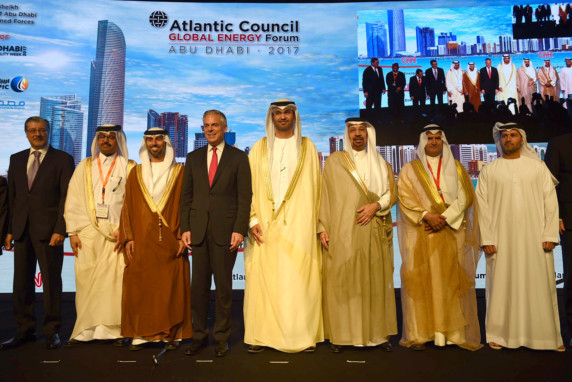
Abu Dhabi: Saudi Energy minister Khalid Al Falih said on Thursday Saudi Arabia consider renewing the historic agreement reached between Opec and non-Opec members beyond six months to rebalance oil markets.
“The agreement which we have is for six months and will consider renewing it,” he said while speaking at Atlantic Council Global Energy Forum in Abu Dhabi on Thursday.
The Organisation of Petroleum Exporting Countries and 11 other producers including Russia agreed on December 10 to jointly cut output by about 1.8 million barrels a day in an effort to end a three-year oil surplus, which sent prices spiralling and battered the economies of producing nations around the world.
Expressing optimism about the deal, the Saudi energy minister said that the agreement between Opec and non-Opec will hold and it will bring stability to oil markets.
“I have the full trust of my colleagues. We took a year debating whether to do this or not because. I am confident that the combination of capping production by 24 countries and growth and demand as well as decline in production of mature oilfields will lead to rebalancing of oil market and prices will response accordingly,” Al Falih said. “Opec agreement has accelerated the rebalancing process and will bring stability to the global oil markets,” he added.
Oil prices moved up since the agreement. Brent crude rose $1.20 (Dh4.40) a barrel to a high of $56.30 on Thursday before easing slightly to trade around $56.20 by 13:30 GMT.
Confident
Meanwhile, Opec Secretary General Mohammad Barkindo said that oil markets will rebalance in the second quarter of this year.
“We are very confident with the timely implementation of historic agreement we will be able to bring forward rebalancing of oil markets. The projections show that by the second quarter of this year, you will be able to see stock drawdown moving towards further towards five year average,” Barkindo said, speaking to reporters on the sidelines of forum.
Asked whether they have any specific price as target, he said their main aim in cutting production is to “rebalance oil markets and restore investment on a sustainable basis”.
“We have no price objective in mind but we are confident that by bringing forward this rebalancing process, we will be able to restore investment in the industry on a sustainable basis.”
Speaking about compliance among member countries, he said all participating countries would comply with production cuts and it is premature to judge that they would not stick to the deal.
Declaration
“For the first time we have been able to establish a broad platform of producers across the spectrum including thirteen Opec countries and eleven non-Opec members who came together to voluntarily sign declaration of cooperation in order to restore stability to this market that has been out of balance for over two years,” Barkindo said.
“It is premature to judge before the monitoring committee adopts a framework of compliance. I have met with the Iraqi oil minister this morning and he has reassured that Iraq will cooperate fully and on a timely basis,” he added.
A ministerial meeting of the monitoring committee will take place in Vienna on January 22 to adopt a framework of compliance, he said.
Kuwait, Venezuela, and Algeria from Opec, Russia and Oman from non-Opec are the members of the committee.












